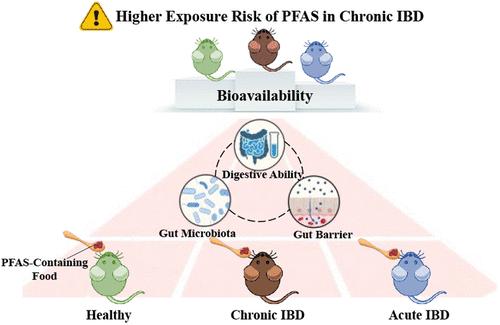当前位置:
X-MOL 学术
›
Environ. Sci. Technol.
›
论文详情
Our official English website, www.x-mol.net, welcomes your feedback! (Note: you will need to create a separate account there.)
Insights into the Enhanced Bioavailability of Per- and Polyfluoroalkyl Substances in Food Caused by Chronic Inflammatory Bowel Disease
Environmental Science & Technology ( IF 10.8 ) Pub Date : 2024-06-27 , DOI: 10.1021/acs.est.4c01511 Yumin Zhu 1 , Xin Yang 1 , Xiaohua Song 1 , Yibo Jia 1 , Yanfeng Zhang 1 , Lingyan Zhu 1
Environmental Science & Technology ( IF 10.8 ) Pub Date : 2024-06-27 , DOI: 10.1021/acs.est.4c01511 Yumin Zhu 1 , Xin Yang 1 , Xiaohua Song 1 , Yibo Jia 1 , Yanfeng Zhang 1 , Lingyan Zhu 1
Affiliation

|
Understanding the bioavailability of per- and polyfluoroalkyl substances (PFAS) in food is essential for accurate human health risk assessment. Given the rising incidence of inflammatory bowel disease (IBD), this study aimed to investigate the impacts of IBD on the bioavailability of PFAS in food using mice models. The relative bioavailability (RBA) of PFAS was the highest in the chronic IBD mice (64.3–144%), followed by the healthy (60.8–133%) and acute IBD mice (41.5–121%), suggesting that chronic IBD enhanced the PFAS exposure risk. In vitro tests showed that the intestinal micelle stability increased as a result of reduced content of short-chain fatty acids, thus promoting the PFAS bioaccessibility in the digestive fluid of chronic IBD. Additionally, increased pathogenic and decreased beneficial bacteria in the gut of IBD groups facilitated the intestinal permeability, thus enhancing PFAS absorption. These together explained the higher RBA of PFAS in the chronic IBD. However, remarkably lower enzymatic activities suggested severely impaired digestive ability in the acute IBD, which facilitated the excretion of PFAS from feces, thus lowering the RBA. Conversely, PFAS exposure might exacerbate IBD by changing the gut microbiota structures. This study hints that individuals with chronic intestinal inflammation might have higher PFAS exposure risk than the healthy population.
中文翻译:

深入了解食品中由慢性炎症性肠病引起的全氟烷基和多氟烷基物质的生物利用度增强
了解食品中全氟烷基物质和多氟烷基物质 (PFAS) 的生物利用度对于准确的人类健康风险评估至关重要。鉴于炎症性肠病 (IBD) 发病率不断上升,本研究旨在利用小鼠模型研究 IBD 对食品中 PFAS 生物利用度的影响。 PFAS 的相对生物利用度(RBA)在慢性 IBD 小鼠中最高(64.3-144%),其次是健康小鼠(60.8-133%)和急性 IBD 小鼠(41.5-121%),这表明慢性 IBD 增强了PFAS 暴露风险。体外试验表明,由于短链脂肪酸含量减少,肠胶束稳定性增加,从而促进慢性IBD消化液中PFAS的生物可及性。此外,IBD组肠道中致病菌的增加和有益菌的减少促进了肠道通透性,从而增强了PFAS的吸收。这些共同解释了慢性 IBD 中 PFAS 的 RBA 较高。然而,酶活性显着降低表明急性IBD的消化能力严重受损,这促进了PFAS从粪便中的排泄,从而降低了RBA。相反,接触 PFAS 可能会改变肠道微生物群结构,从而加剧 IBD。这项研究暗示,患有慢性肠道炎症的个体可能比健康人群有更高的 PFAS 暴露风险。
更新日期:2024-06-27
中文翻译:

深入了解食品中由慢性炎症性肠病引起的全氟烷基和多氟烷基物质的生物利用度增强
了解食品中全氟烷基物质和多氟烷基物质 (PFAS) 的生物利用度对于准确的人类健康风险评估至关重要。鉴于炎症性肠病 (IBD) 发病率不断上升,本研究旨在利用小鼠模型研究 IBD 对食品中 PFAS 生物利用度的影响。 PFAS 的相对生物利用度(RBA)在慢性 IBD 小鼠中最高(64.3-144%),其次是健康小鼠(60.8-133%)和急性 IBD 小鼠(41.5-121%),这表明慢性 IBD 增强了PFAS 暴露风险。体外试验表明,由于短链脂肪酸含量减少,肠胶束稳定性增加,从而促进慢性IBD消化液中PFAS的生物可及性。此外,IBD组肠道中致病菌的增加和有益菌的减少促进了肠道通透性,从而增强了PFAS的吸收。这些共同解释了慢性 IBD 中 PFAS 的 RBA 较高。然而,酶活性显着降低表明急性IBD的消化能力严重受损,这促进了PFAS从粪便中的排泄,从而降低了RBA。相反,接触 PFAS 可能会改变肠道微生物群结构,从而加剧 IBD。这项研究暗示,患有慢性肠道炎症的个体可能比健康人群有更高的 PFAS 暴露风险。






































 京公网安备 11010802027423号
京公网安备 11010802027423号